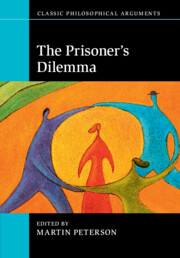Book contents
- Frontmatter
- Contents
- List of contributors
- Introduction
- 1 Why all the fuss? The many aspects of the Prisoner's Dilemma
- 2 How I learned to stop worrying and love the Prisoner's Dilemma
- 3 Taking the Prisoner's Dilemma seriously: what can we learn from a trivial game?
- 4 Prisoner's Dilemma doesn't explain much
- 5 The Prisoner's Dilemma and the coevolution of descriptive and predictive dispositions
- 6 I cannot cheat on you after we talk
- 7 Prisoner's Dilemma cannot be a Newcomb Problem
- 8 Counterfactuals and the Prisoner's Dilemma
- 9 The Tragedy of the Commons as a Voting Game
- 10 The role of numbers in Prisoner's Dilemmas and public good situations
- 11 The inner struggle: why you should cooperate with people you will never meet again
- 12 Prisoner's Dilemmas, intergenerational asymmetry, and climate change ethics
- 13 Prisoner's Dilemma experiments
- 14 The lesson of the Prisoner's Dilemma
- Bibliography
- Index
4 - Prisoner's Dilemma doesn't explain much
Published online by Cambridge University Press: 05 July 2015
- Frontmatter
- Contents
- List of contributors
- Introduction
- 1 Why all the fuss? The many aspects of the Prisoner's Dilemma
- 2 How I learned to stop worrying and love the Prisoner's Dilemma
- 3 Taking the Prisoner's Dilemma seriously: what can we learn from a trivial game?
- 4 Prisoner's Dilemma doesn't explain much
- 5 The Prisoner's Dilemma and the coevolution of descriptive and predictive dispositions
- 6 I cannot cheat on you after we talk
- 7 Prisoner's Dilemma cannot be a Newcomb Problem
- 8 Counterfactuals and the Prisoner's Dilemma
- 9 The Tragedy of the Commons as a Voting Game
- 10 The role of numbers in Prisoner's Dilemmas and public good situations
- 11 The inner struggle: why you should cooperate with people you will never meet again
- 12 Prisoner's Dilemmas, intergenerational asymmetry, and climate change ethics
- 13 Prisoner's Dilemma experiments
- 14 The lesson of the Prisoner's Dilemma
- Bibliography
- Index
Summary
4.1 Introduction
The influence of the Prisoner's Dilemma on economics, law, political science, sociology, and even anthropology and biology is hard to overstate. According to JSTOR, almost 16,000 articles about it have appeared since 1960, with no sign of slowing down: 4,400 were just in the last 10 years. It has a high profile in non-academic media too. It appears as an explanation of phenomena as disparate as business strategy, political bargaining, gender relations and animal behavior. Historians of social science have referred to the Prisoner's Dilemma as a “mainstay” (Morgan 2012: 348) and an essential “set piece” (Rodgers 2011: 64). And according to Robert Axelrod, “the two-person iterated Prisoner's Dilemma is the E. coli of the social sciences” (quoted in McAdams 2009: 214).
As philosophers, our aim is to assess whether this development has been worthwhile and furthered the goals of social science. We ask this question even knowing that it cannot be answered fully in a single article. The research programs that the Prisoner's Dilemma has inspired are many and diverse, and the Prisoner's Dilemma is only one of many models that have been used in them. In addition, social science, like science in general, has many different goals and a judgment of worth whileness requires a devilishly complex integration of conflicting considerations and values. Finally, sixty years may or may not be a sufficient span to judge. Nevertheless, we will brave giving a prima facie case that on at least one central criterion, namely providing causal explanations of field phenomena involving human co-operation, the Prisoner's Dilemma has failed to live up to its promise.
Before we start, two clarifications are in order. First, we do not wish to criticize the use of the Prisoner's Dilemma on moral or political grounds. It might be that teaching and using it makes people behave more selfishly and normalizes a narrow conception of rationality (Dupré 2001, Marwell and Ames 1981). But our concern is purely methodological: has the Prisoner's Dilemma delivered empirical success?
- Type
- Chapter
- Information
- The Prisoner's Dilemma , pp. 64 - 84Publisher: Cambridge University PressPrint publication year: 2015
- 12
- Cited by

